Tuberous Sclerosis
What is tuberous sclerosis?
Tuberous sclerosis is the disease condition where multiple benign tumours or nodules are formed in different major organs including brain, eye, kidney, lungs, heart and skin. The disease is a resultant of complex genetic abnormality. The tumour growth is developed due to genetic abnormality affects the cellular proliferation, differentiation and delay development.
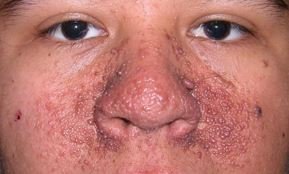
Image 1: Tuberous Sclerosis
Severity varies from individual to individual and worsen conditions occur with individual affected with brain. This often associated with cognitive impairment, seizure attacks, hindered mental growth and autism which often interfere with quality of life of the patient. Some of the individual with tuberous sclerosis can face the challenges of life and can still hold prestigious profession like doctor, professor, advocate and many more.
Tuberous Sclerosis Symptoms
Depending upon the organ mainly affected with tuberous sclerosis, the symptoms are varying. Some general symptoms associated with tuberous sclerosis are as follows:
Symptoms associated with brain: The affected part of the brain commonly causes different symptoms association. The three types of the tuber formation occur in the brain: cortical tubers, subependymal nodules and subependymal giant-call astrocytomas. Cortical tubers form at the surface of the brain and rarely affect deeper areas.
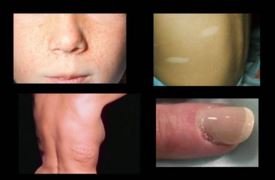
Image 2: In different sites development of tuberous sclerosis
Subependymal nodules often developed in the border of the ventricles. In advanced stage of subependymal nodules turned to subependymal giant-call astrocytomas and causes blockage of CSF flow and increase the pressure inside the brain. The following symptoms are common in brain tuberous sclerosis.
- Head ache
- Epileptic attacks
- Intellectual disability
- Learning incapability
- Behavioural disorder
- Autism
Symptoms associated with kidney: Four types of nodules can form in the kidney, which hamper kidney functioning and even kidney failure.
- Blood in urine
- Painful urination
- Pain at backside
- Anaemia
- In rare cases it leads to cancerous growth.
Symptoms associated with Heart: This disorder often occurs as congenital heart disease and named as cardiac rhabdomyomas. In most of the cases the nodules are larger in size at the birth time and with increasing of age, size become smaller and does not interfere in normal living.
Symptoms associated with Lungs, Liver and Pancreas: Some people have pulmonary cyst which interfere the normal lungs functioning.
Some individuals have hepatic cyst and sometimes hepatic tuberous sclerosis turns hepatic angiomyolipoma which is a benign mass developed at the wall of the liver.
Symptoms associated with eye: Individual having affects in eye usually develop benign tumour in the eye and appear white patch on the retina but they do not interfere in the visualization.
Symptoms associated with Skin: The skin is a commonly affected site and has the following symptoms.
- Discoloured patches in the skin
- Red coloured nodules like structure developed at the facial skin.
- Elevated discoloured patches at the forehead
- Thick keratinized skin
- Tumour is formed at side of the nails
- Brown flat marks develop at the neck
- Scalp, eye lids gets discoloured or white patches.
Tuberous Sclerosis Causes
Either TCS1 or TCS2 gene abnormality causes tuberous sclerosis. TCS1 and TCS2 gene are attached with each other in coiled shape structure and interrelate with each other. TCS2 are largely found in brain, kidney, skin and heart. It not always necessary, that these faulty genes always transferred from parents. Only 1% incidence is inherited. Most of the time, either of these genes mutates abnormally which causes development of tuberous sclerosis. TCS1 are TCS2 the genes which help to control cell proliferation and restrict uncontrollable cell growth.
Tuberous Sclerosis Treatment
Treatment of tuberous sclerosis is based on symptoms. Permanent cure is not possible in tuberous sclerosis, but depending upon the symptoms, doctors prescribe medication to relieve the patient’s discomfort which includes:
Pharmaco therapy
- Medications are available for controlling the seizure attacks.
- Medication is available to control the tumours growth in brain. Drug manufacturers manufactured a drug which can able to minimize the size of the kidney tumours. The name of the drug is Everolimus. This is highly recommended now days and even some cases restrict the surgical removal of the tumour.
- Ointment is available to treat melanin imbalance and discoloration. Sirolimus is the drug which helps to control skin lesions.
- Medications are also available to treat the anxiety, depression and psychological disorders.
Educational and Behavioural Therapies
- Children having tuberous sclerosis need special educational therapies to overcome the cognitive impairment and delaying learning capacity.
- Behavioural therapies can help to improve the management of behavioural abnormalities in case of brain nodules development.
Vocational Training
- Patient with tuberous sclerosis need vocational training in different aspects which may improve their quality of life and help to successfully face the challenges of the life.
Laser therapy or Dermabrasion
- Depending upon the severity, skin lesion can be treatable with laser therapy.
Surgical intervention
- Surgery is recommended is case of heart and kidney nodules which cannot shrink with medications.
- Surgery also helps to control the epileptic attacks by removing affected brain lesions.
Novel medical approach
- Clinical research developed mTOR inhibitors which will be future medical treatment for tuberous sclerosis. Research provides evidence that blocking of mTOR helps to disrupt the chemical reaction needs to develop nodules.
Proper healthcare support, regular follow up and careful monitoring of symptoms can give a productive and normal life expectancy to a tuberous sclerosis patient.
Life Expectancy
The life expectancy depends upon severity of the tuberous sclerosis. Individuals with mild tuberous sclerosis and not having prominent symptomatic approaches can have normal life expectancy and even in present of mild symptoms, regular health check up give them a normal life.
Life expectancy is less in case of brain and kidney tumour, as they may interfere with other physiological systems.
Pictures
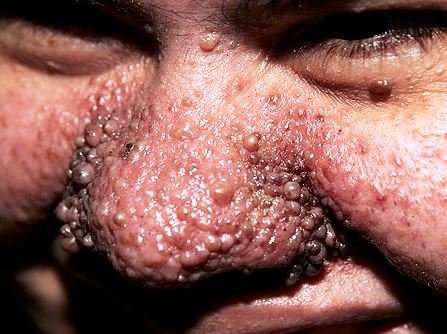
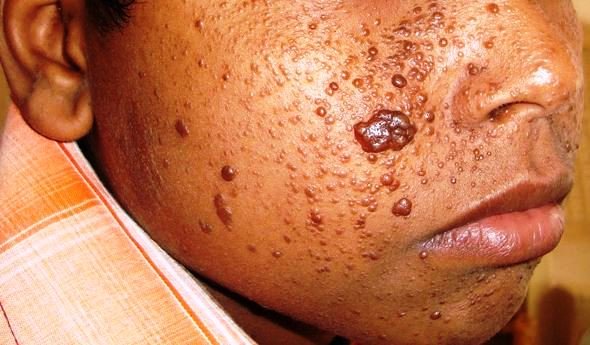
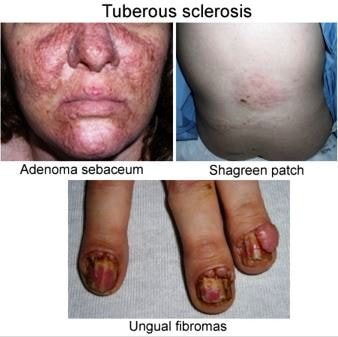
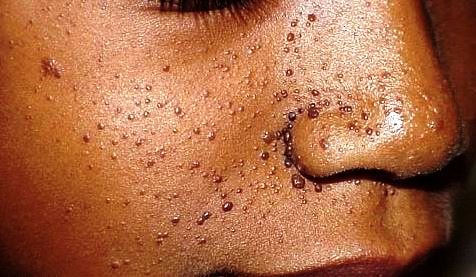

References
- What is TSC? http://www.tsalliance.org/pages.aspx?content=2
- Tuberous sclerosis complex essentials, background, pathophysiology at http://emedicine.medscape.com/article/1177711-overview
- https://www.ninds.nih.gov/disorders/tuberous_sclerosis/detail_tuberous_sclerosis.htm
- Tuberous Sclerosis Definition, Symptoms, Tests, Diagnosis at http://www.mayoclinic.org/diseases-conditions/tuberous-sclerosis/basics/definition/con-20032953
- http://www.nhs.uk/conditions/tuberous-sclerosis/Pages/Introduction.aspx
